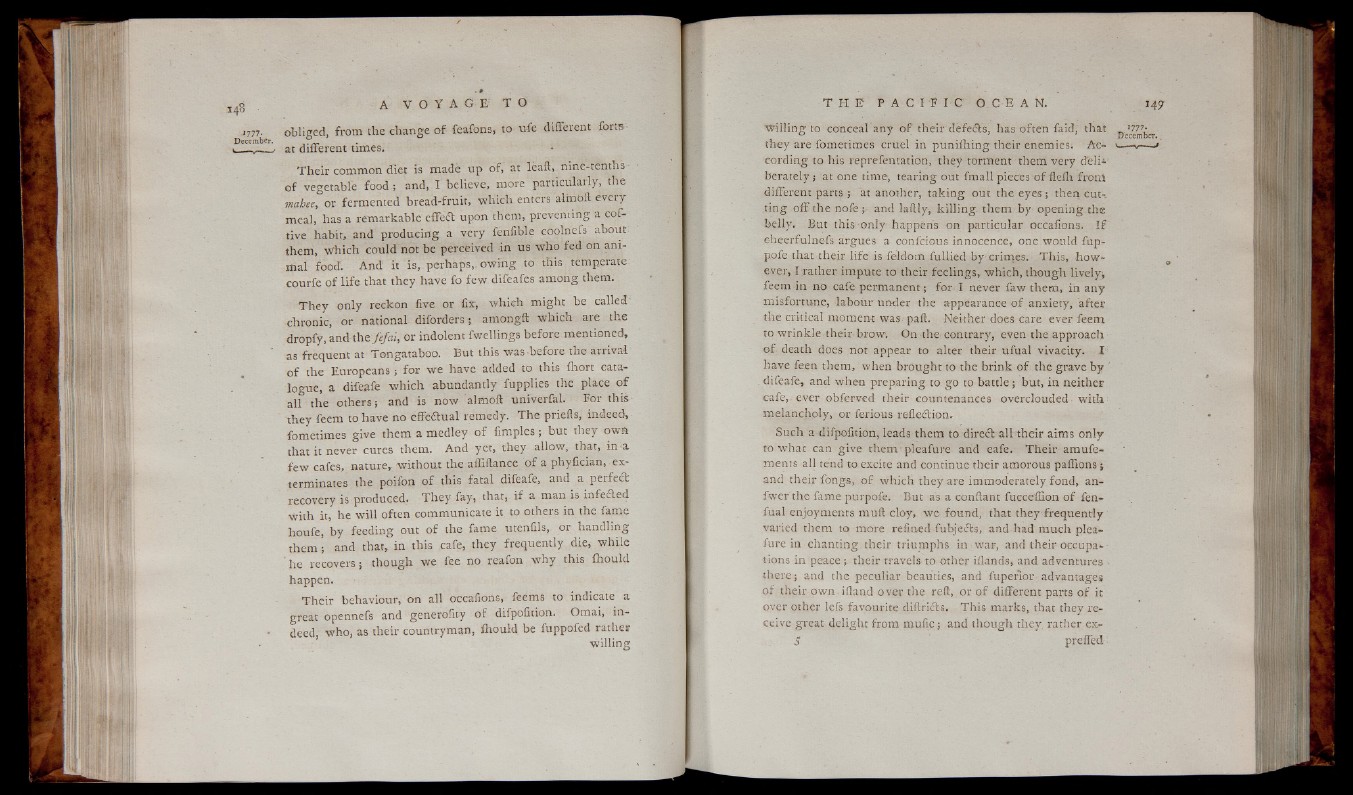
>777- obliged, from the change o f feafons, to ufe different for,s
December. .
— ^ at different times.
T h e ir common diet is made u p of, at leaft, nine-tenths •
o f vegetable fo o d ; and, I believe, more particularly, the
mahee, or fermented bread-fruit, w h ich enters almoft every
meal, has a remarkable efFeft upon them, preventing a cof-
tive habit, and producing a ve ry fenlible coolnefs about
them, w h ich could not be perceived in us who fed on animal
food. And it is, perhaps,, ow in g to this temperate-
courfe o f li fe that they have fo few difeafes among them.
T h e y only reckon five or fir, which might be called
chronic, or national diforde rs; amongfb w hich are the
dropfy, and the jefai, or indolent fwe llings before mentioned,
as frequent at Tongataboo. But this was before the arrival
o f the E u ropean s; fo r w e have added to this ihort catalogue,
a difeafe w h ich abundantly fupplies the place o f
all the others; and is n ow almoft univerfal. For this-
the y feem to have no cfi'cclu a 1 remedy. T he priefts, indeed,
fometimes give them a medley o f fim p le s ; but they own
that it never cures them. And yet, they allow, that, in a
few cafes, nature, without the afliftance o f a phyfician, exterminates
the poifon o f this fatal difeafe, and a perfedl
recovery is produced. T h e y fay, that, i f a man is in fe a e d
w ith it, he w ill often communicate it to others in the fame
houfe, by feeding out o f the fame utenfils, or handling
th em ; and that, in this cafe, they frequently die, w h ile
' he re cove rs; though w e fee no reafon w h y this ihould
happen.
T h e ir behaviour, on all occafions, feems to indicate a
great opennefs and generofit-y o f difpofition. Omai, indeed,
who, a s their countryman, ihould be fuppofed rather
w illin g
w illin g to conceal any o f their defe&s, has often faid, that
J D e c em b e r .
they are fometimes cruel in p un iih ing their enemies. Ac- >— v——j
cording to his reprefentation, they torment them ve ry cfeli-
be ra te ly ; at one time, tearing out fmall pieces o f flefli from
different parts ; at another, tak in g out the e y e s ; then cut-,
ting o ff the n o f e a n d laftly; k illin g, them by opening the
be lly. But this only- happens on particular occafions. I f
c-heerfulnefs argues a confcious innocence, one would fup-
pofe that their life is feldom fullied by crimes. T h is , how ever,
I rather impute to their feelings, which, though lively;
feem in no cafe perman ent; fo r I never faw them, in any
misfortune, labour under the appearance o f anxiety, after
the critical moment was paft. Neither does care ever feem
to wrinkle their-brow; On the contrary, even the approach
o f death does not appear to alter their ufua l vivacity. I
have feen them, when brought to the brink o f the grave by
difeafe, and when preparing to go to battle ; but, in neither
cafe,- ever obferved their countenances overclouded with
melancholy, or ferious reflection.
Such a difpofition, leads them to direft all their aims only
to what can giv e them pleafure and eafe. T h e ir amufe-
ments all tend to excite and continue their amorous paflions ;
and their flongs, o f which they are immoderately fond, an-
fw e r the fame purpofe. But as a conftant fucceffion o f fen-
fual enjoyments muft cloy, w e found, that they-frequently
varied them to more refined fubjeCts, and had much pleafure
in chanting their triumphs in war, and their occupations
in peace ; their travels to other iilands, and adventures ■
th e re ; and the peculiar beauties, and fuperior advantages
o f their own ifland o ve r the reft, or o f different parts o f it
over other lefs favourite diftrids. T his marks, that they receive
great delight from m u fic ; and though they rather ex-
S prefled